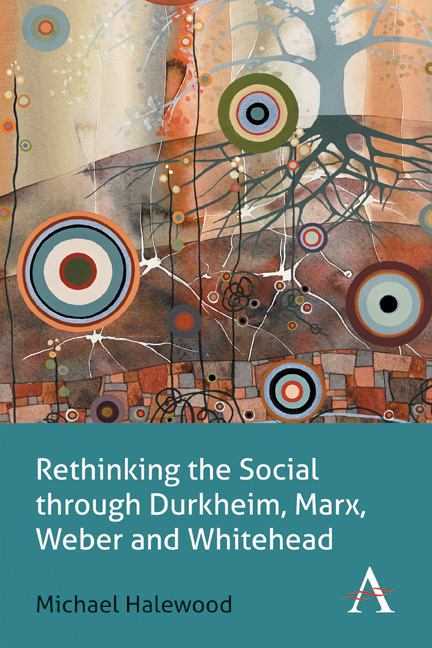Book contents
- Frontmatter
- CONTENTS
- Acknowledgements
- List of Abbreviations
- Chapter One Rethinking the Social
- Chapter Two Durkheim Approaches the Social
- Chapter Three Durkheim's Philosophy of the Social
- Chapter Four Marx on the Social and the Societal
- Chapter Five Weber's “Sozial” Action
- Chapter Six The Early Death of the Problem of the Social
- Chapter Seven Toward a Philosophy of the Social – Part One: Durkheim, Marx, Weber (and Simmel) Revisited
- Chapter Eight Toward a Philosophy of the Social – Part Two: Whitehead on Sociology, Societies and the Social
- Notes
- References
- Index
Chapter Four - Marx on the Social and the Societal
Published online by Cambridge University Press: 05 December 2015
- Frontmatter
- CONTENTS
- Acknowledgements
- List of Abbreviations
- Chapter One Rethinking the Social
- Chapter Two Durkheim Approaches the Social
- Chapter Three Durkheim's Philosophy of the Social
- Chapter Four Marx on the Social and the Societal
- Chapter Five Weber's “Sozial” Action
- Chapter Six The Early Death of the Problem of the Social
- Chapter Seven Toward a Philosophy of the Social – Part One: Durkheim, Marx, Weber (and Simmel) Revisited
- Chapter Eight Toward a Philosophy of the Social – Part Two: Whitehead on Sociology, Societies and the Social
- Notes
- References
- Index
Summary
Introduction
Does Marx have a concept of the social? As with Durkheim, this is a slightly unfair question but, as was seen in the previous chapters, it can still be an illuminating one. Take, for example, the following, long, quotation from Marx's Preface to A Contribution to the Critique of Political Economy. This is one of the most famous but notorious sections of Marx's writings and it contains many uses of the words “social” and “society” which, one would hope, might indicate his understanding of these terms.
In the social [gesellschaftlichen] production of their existence, men inevitably enter into definite relations [Verhältnisse], which are independent of their will, namely relations of production appropriate to a given stage in the development of their material forces of production. The totality of these relations of production constitutes the economic structure of society [Gesellschaft], the real foundation, on which arises a legal and political superstructure and to which correspond definite forms of social [gesellschaftliche] consciousness. The mode of production of material life conditions the general process of social [sozialen], political and intellectual life. It is not the consciousness of men that determines their existence, but their social [gesellschaftliches] existence that determines their consciousness. At a certain stage of development, the material productive forces of society [Gesellschaft] come into conflict with the existing relations of production or – this merely expresses the same thing in legal terms – with the property relations within the framework of which they have operated hitherto. From forms of development of the productive forces these relations turn into their fetters. Then begins an era of social [soziale] revolution. (CWME 29, 263; MEW 13, 8–9)
The proliferation of the adjective “social” and the noun “society” are noticeable. There is the social production of existence. There is a structure of society and this relates to a kind of social consciousness. There is social life.
- Type
- Chapter
- Information
- Publisher: Anthem PressPrint publication year: 2014

